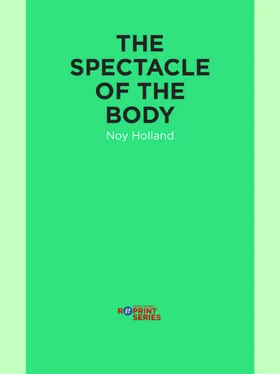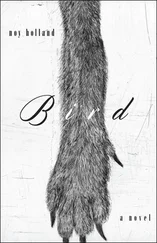It is not in the blood of any of us to know quite how to tell it, to tell quite what we know.
We are liable to start in the thick of it, with the hot spell, say, the heat of the day RC came to town and shot up the signs where the signal hangs, before the signal hung there before he went off to the aluminum mall and shot up the back of the aluminum mall, or after, no, before then. Arnold, Vern, making their way up to Verda’s store with the rest of the boys behind them, try, as they go, to tell it, to figure what all it was RC sprayed with shot the August day the car took him off to Memphis — stop signs, sure, the aluminum mall, the ass end of a livestock truck — bickering, the stay-at-home boys, bogging down on the order of things, the sequence of the day’s events, the details, the lemonade, the heavy boots he wore.
All of what RC filled with shot before he got behind the Feed and Seed, you can get, in time, from Arnold. That the livestock truck RC shot up was soughing in the parking lot while the driver lagged with Verda, let his tongue grow long with Verda, drinking sour bee — for all of that, ask Arnold.
You can get none of it from Verda. From Verda, you will get that he bungled his soul, by accident, with buckshot — nothing about the six-legged dog, nothing about the livestock truck.
Should Arnold omit the early hours, which he is almost sure to do, the cooler dark before the spree that set the day in motion — ask Ida, who will tell you about the head of the fish that hung on the wall on the front of the store for years until it was stolen, sneaked off early that August day that looked like any other day except we saw them — Arnold first in his silly hat, dragging the fish through town, and after, in the heat souping off the blacktop, RC marching down in his heavy boots, an armed and only posse come to take back what was his. It was high drama for this bottomed-out town we none of us saw to the end of. We were porch-sitting, spectating, leaving it to run its course with the stupid, stunted eyesight of people accustomed to nothing happening.
Ida says, “Remember that old beagle, RC? Remember that fellow Flavius Ray we used to see on TV?”
The balloons deflate; the streamers fray. The feathery cloak of mold grows back on the surplus cheese.
Ida sings a bit of something. “Remember that, RC?”
All the answer RC makes is to snort and bray when she hangs her head and paces in front of the woodstove. Giraffe , Ida says, and kangaroo, hippopotami , and elephant.
“When’s the last time you saw a kangaroo come through Union City?” she says.
She polishes off the gin.
“Ah hah!” Ida says.
RC wags his finger, raises what is left of his eyebrow on the side that is left of his face.
“Say it one more time, Ida, and I will knock you upside down,” Opal says, and she would; Opal says she means it — but RC is laughing so hard by now, he is all anyone can hear.
The schoolgirls quit coming to feed RC. The boys come back with their lunch pails until that have stolen everything in Verda’s store fit for boys their size to steal, and then go elsewhere after school.
The girls try to make an afghan, each taking her turn with the crochet hooks in the easy chair by the stove. Opal, her big hands stiff, quits before even a corner is hooked. Ida lets the ball of yarn catch fire underneath the woodstove, sinks deeper into the easy chair through the mildew hue of the days. The days, the girls know, keep passing. They know the ground might freeze — despite the heat and fire glow, despite the way the same dream repeats itself inside.
They try to keep things spruced up. The streamers Opal strung from RC’s chair wilt and tear and Verda tapes the torn ends back together. She unties the balloons; Opal plumps them up; Ida ties them back again. They are tacking balloons to the rafters when the stay-at-home boys show up at the store with a dew of sweat settled onto their lips, with their buttons pulled to popping, flushed to talk about RC.
“Heavens, yes,” the girls say. “Goodness, yes. Yes, yes, you boys come ahead on in.”
And they do. And they all, even the dandiest, get to drinking Pabst from cans.
Arnold gets to talking about his truancy from school, about a switching he took for a school day skipped some sixty years ago when the carnival came to town.
“Naw, Arnold,” says another old boy, and Arnold says, “Say?”
“Nineteen ten, you tell me?” says the other. “You saying 1910 it came?”
“”Did I say 1910?” Arnold says. “Because would I say 1910,” he says, “if it wasn’t for 1910 it came? It was 1910, I tell you.”
“Naw, Arnold. That ain’t it.”
“It’s it,” says Arnold.
“It ain’t,” says the other.
And so on, and so on, until Opal says, “Shit, boy,” and walks off to the back of the store to fetch more cans of beer.
Verda pops the tops off passes, the cans around. She presses her beer against RC’s neck so he knows how cold they feel.
“Okay, so 1910,” Ida says. “You was, oh, eleven.”
It is not until much later — not until after they have brought RC on the bed of Arnold’s truck through town — that the girls know it is Arnold who stole the fish, the proof of RC’s fish story, and remember then these waiting days when they sat with Arnold at RC’s feet and shared their Pabst Blue Ribbon.
“I took a licking with a hickory switch to see that goddamn cow,” Arnold says. “And do you know,” Arnold says, turning now to speak to RC with a sudden, beery boldness, “You, RC, you said that cow, you said that cow had two heads.” RC’s eye blinks open and Arnold stops hearing himself at all. “Two heads! Two heads!” he shouts, getting louder, looking up at RC, seeing the murky calm of the eye left to RC to open. “ Lookee, boys! ” Arnold barks, a good carny shrill. “ You flash ‘em, we’ll cash ‘em. Never in the history of the world! ”
Arnold tries to stand, drops back, falls with his hands in his pockets.
Ida pats him on the knee.
“It was nothing but a hump of bone,” Vern says, seeing that Arnold is quiet, “why, a funny lump of muscle.”
Ida takes her hand from the old man’s knee and, kneeling on the floor behind him, rubs his chest with her fingertips, saying, “Arnold, Arnold,” searching, finding with her hand the tiny hurt lodged in his heart these years.
Here they are on the church pew with a quilt drawn across their legs: Opal, Arnold, Ida, lined up big to small. The wreaths hang above their heads.
The rest of the boys are home asleep, worn out with the thrill of the two-headed cow, the six-legged pup, the Negress — the early signs, they claim, of the hopeless sump of RC’s later years.
Verda is in the store with a bucket, sponging RC down.
“Maybe you boys are right,” Opal says.
“Say?” Arnold says.
“Maybe that’s where this started.”
Opal waits for the old man to say something. “With RC, I mean. I’m saying if it’s true,” Opal says, “because it might be.”
“What do you mean?” says Arnold.
“I’m only just saying what you said. You’re the one what said it.”
“He was rolling in the hay with that Negress!” Arnold says. “That’s what I said!”
“Will you stop it?” Ida says. “You two, you, Opal, please.”
Ida turns the quilt back, and she walks back behind the store and cries in the high weeds.
She thinks of polio and yellow fever, whiskey wars, locusts, barn-burning and church-burning and the floods of ’42. The Mississippi frozen as far south as Vicksburg, girls.
The things RC has told them!
But the Negress is something new.
Ida walks further out away from the store, stumbling over the harrowed ground that used to be RC’s garden. The ground is soft still, weedy, softest under Ida’s feet in the weedless place she had helped RC dig the hole for the six-legged dog. Ida sees RC’s pale body, cloudy in the Visqueen tacked to the windows at the back of the store. She thinks of the six-legged dog, the generations of six-legged beagles, the best bitch saved from every litter, the one whose legs were long. She thinks of what care RC took with what there was to be found of the dog, how he arranged it in the trough of clay, placed it back together. When he had gotten the dog arranged, Ida helped him gather the bright broad leaves of the cucumber magnolias that grew where the river used to flow, helped him lay them along in a bright, green sheet above the bloody pieces.
Читать дальше











